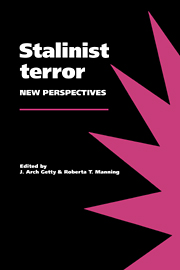2 - The Politics of Repression Revisited
Published online by Cambridge University Press: 07 December 2009
Summary
Every national history has its oral tradition. Like folklore, such traditions relate popularly accessible histories without reference to documentary analysis or other tools of the trade of professionally trained historians. Sometimes they are based on self-attesting personal accounts and memoirs, on logical constructs of “what must have happened,” or on simple repetition of seemingly authoritative stories of unknown origin. The ideas that Franklin Roosevelt wanted the Japanese to attack Pearl Harbor, that Adolf Hitler did not know about the Holocaust, or that modern history is manipulated by huge but secret conspiracies (organized by Elders of Zion, Masons, or other secret fraternities) are examples of such traditions. Oral historical traditions are persistent, often surviving in the face of contradictory sources and evidence, because they are simple, comfortable, or tantalizing. Sometimes, of course, they can be true.
Russian history has always provided fertile soil for such folkloric history. The last thousand years are filled with stars secretly living out their final years as monks, heirs to the throne spirited away from death at the last minute by loyal nannies, and a perhaps inordinate number of secret conspiracies. The obsessive secrecy of the Soviet regime further stimulated the oral tradition. Stories about Stalin have circulated at least since the 1920s and include aspects of his genealogy (he was said to be descended from Georgian or Ossetian princes), personal life (secret wives, amorous ballerinas, and illegitimate children in the Kremlin), and the circumstances of his youth and death.
- Type
- Chapter
- Information
- Stalinist TerrorNew Perspectives, pp. 40 - 62Publisher: Cambridge University PressPrint publication year: 1993
- 2
- Cited by

